Monash University PSY1011: Article Matrix on Mindfulness & Stress
VerifiedAdded on 2023/04/11
|8
|1297
|282
Literature Review
AI Summary
This assignment presents a literature review in the form of an article matrix, focusing on Mindfulness-Based Stress Reduction (MBSR) and its effects on stress, mental health, and disease management. It summarizes three articles, detailing their rationales, methodologies, results, and conclusions. The first article examines the impact of a mindfulness training program on nurses in critical care, highlighting its potential to reduce stress and improve happiness. The second article compiles a systematic review of MBSR studies, assessing the overall success ratio of such programs on employees' mental health. The third article explores how MBSR can support nurses in managing their mental health and assisting patients, acting as a non-pharmacological method to reduce anxiety and improve chronic disease management. The review identifies limitations in the existing research, such as the absence of control groups and follow-up mechanisms, and suggests future directions for improving the integration of MBSR into healthcare practices. The assignment concludes by emphasizing the potential of MBSR to reduce the burden on healthcare systems and improve patient outcomes.

1
Paraphrase This Document
Need a fresh take? Get an instant paraphrase of this document with our AI Paraphraser
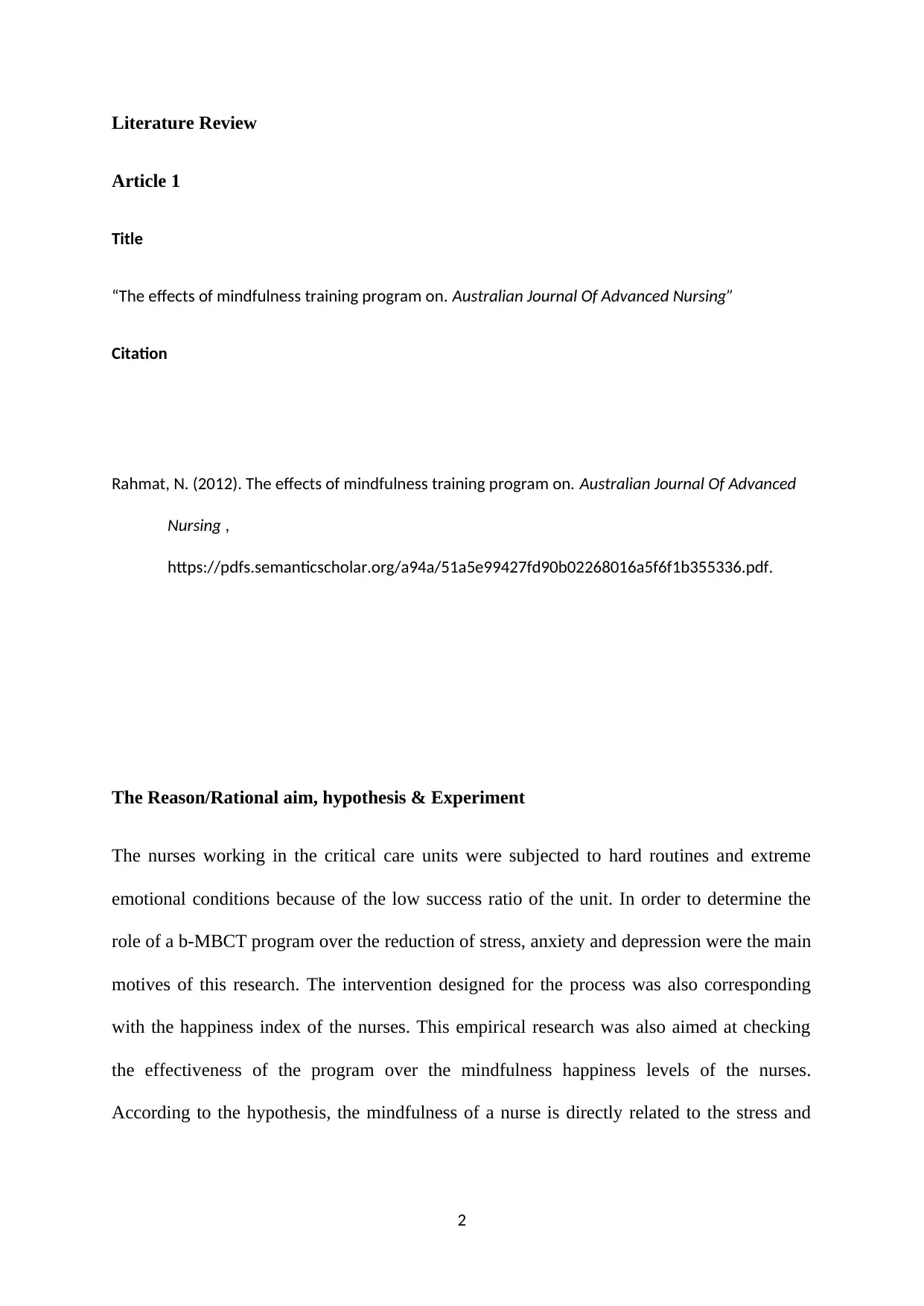
Literature Review
Article 1
Title
“The effects of mindfulness training program on. Australian Journal Of Advanced Nursing”
Citation
Rahmat, N. (2012). The effects of mindfulness training program on. Australian Journal Of Advanced
Nursing ,
https://pdfs.semanticscholar.org/a94a/51a5e99427fd90b02268016a5f6f1b355336.pdf.
The Reason/Rational aim, hypothesis & Experiment
The nurses working in the critical care units were subjected to hard routines and extreme
emotional conditions because of the low success ratio of the unit. In order to determine the
role of a b-MBCT program over the reduction of stress, anxiety and depression were the main
motives of this research. The intervention designed for the process was also corresponding
with the happiness index of the nurses. This empirical research was also aimed at checking
the effectiveness of the program over the mindfulness happiness levels of the nurses.
According to the hypothesis, the mindfulness of a nurse is directly related to the stress and
2
Article 1
Title
“The effects of mindfulness training program on. Australian Journal Of Advanced Nursing”
Citation
Rahmat, N. (2012). The effects of mindfulness training program on. Australian Journal Of Advanced
Nursing ,
https://pdfs.semanticscholar.org/a94a/51a5e99427fd90b02268016a5f6f1b355336.pdf.
The Reason/Rational aim, hypothesis & Experiment
The nurses working in the critical care units were subjected to hard routines and extreme
emotional conditions because of the low success ratio of the unit. In order to determine the
role of a b-MBCT program over the reduction of stress, anxiety and depression were the main
motives of this research. The intervention designed for the process was also corresponding
with the happiness index of the nurses. This empirical research was also aimed at checking
the effectiveness of the program over the mindfulness happiness levels of the nurses.
According to the hypothesis, the mindfulness of a nurse is directly related to the stress and
2
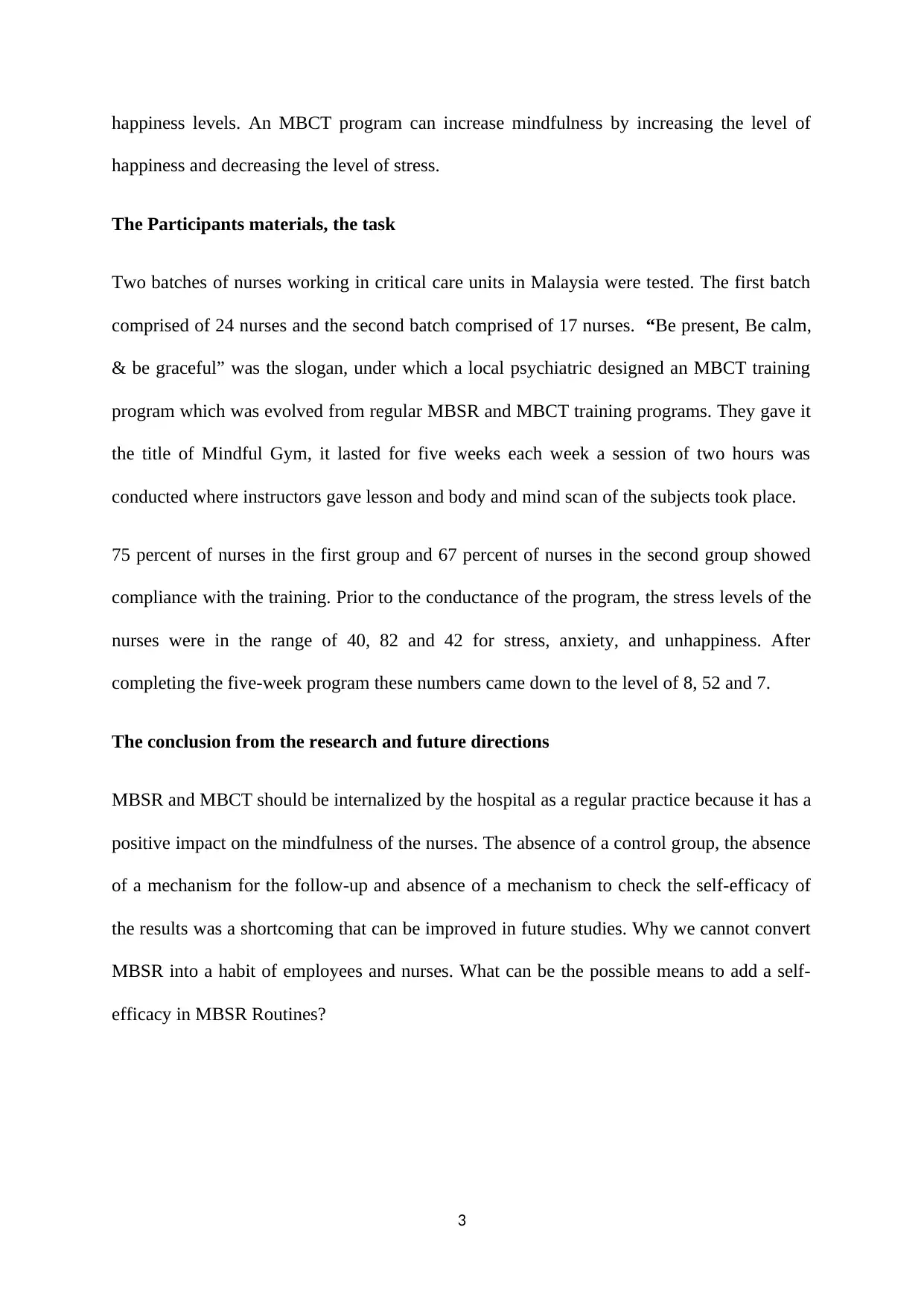
happiness levels. An MBCT program can increase mindfulness by increasing the level of
happiness and decreasing the level of stress.
The Participants materials, the task
Two batches of nurses working in critical care units in Malaysia were tested. The first batch
comprised of 24 nurses and the second batch comprised of 17 nurses. “Be present, Be calm,
& be graceful” was the slogan, under which a local psychiatric designed an MBCT training
program which was evolved from regular MBSR and MBCT training programs. They gave it
the title of Mindful Gym, it lasted for five weeks each week a session of two hours was
conducted where instructors gave lesson and body and mind scan of the subjects took place.
75 percent of nurses in the first group and 67 percent of nurses in the second group showed
compliance with the training. Prior to the conductance of the program, the stress levels of the
nurses were in the range of 40, 82 and 42 for stress, anxiety, and unhappiness. After
completing the five-week program these numbers came down to the level of 8, 52 and 7.
The conclusion from the research and future directions
MBSR and MBCT should be internalized by the hospital as a regular practice because it has a
positive impact on the mindfulness of the nurses. The absence of a control group, the absence
of a mechanism for the follow-up and absence of a mechanism to check the self-efficacy of
the results was a shortcoming that can be improved in future studies. Why we cannot convert
MBSR into a habit of employees and nurses. What can be the possible means to add a self-
efficacy in MBSR Routines?
3
happiness and decreasing the level of stress.
The Participants materials, the task
Two batches of nurses working in critical care units in Malaysia were tested. The first batch
comprised of 24 nurses and the second batch comprised of 17 nurses. “Be present, Be calm,
& be graceful” was the slogan, under which a local psychiatric designed an MBCT training
program which was evolved from regular MBSR and MBCT training programs. They gave it
the title of Mindful Gym, it lasted for five weeks each week a session of two hours was
conducted where instructors gave lesson and body and mind scan of the subjects took place.
75 percent of nurses in the first group and 67 percent of nurses in the second group showed
compliance with the training. Prior to the conductance of the program, the stress levels of the
nurses were in the range of 40, 82 and 42 for stress, anxiety, and unhappiness. After
completing the five-week program these numbers came down to the level of 8, 52 and 7.
The conclusion from the research and future directions
MBSR and MBCT should be internalized by the hospital as a regular practice because it has a
positive impact on the mindfulness of the nurses. The absence of a control group, the absence
of a mechanism for the follow-up and absence of a mechanism to check the self-efficacy of
the results was a shortcoming that can be improved in future studies. Why we cannot convert
MBSR into a habit of employees and nurses. What can be the possible means to add a self-
efficacy in MBSR Routines?
3
⊘ This is a preview!⊘
Do you want full access?
Subscribe today to unlock all pages.

Trusted by 1+ million students worldwide
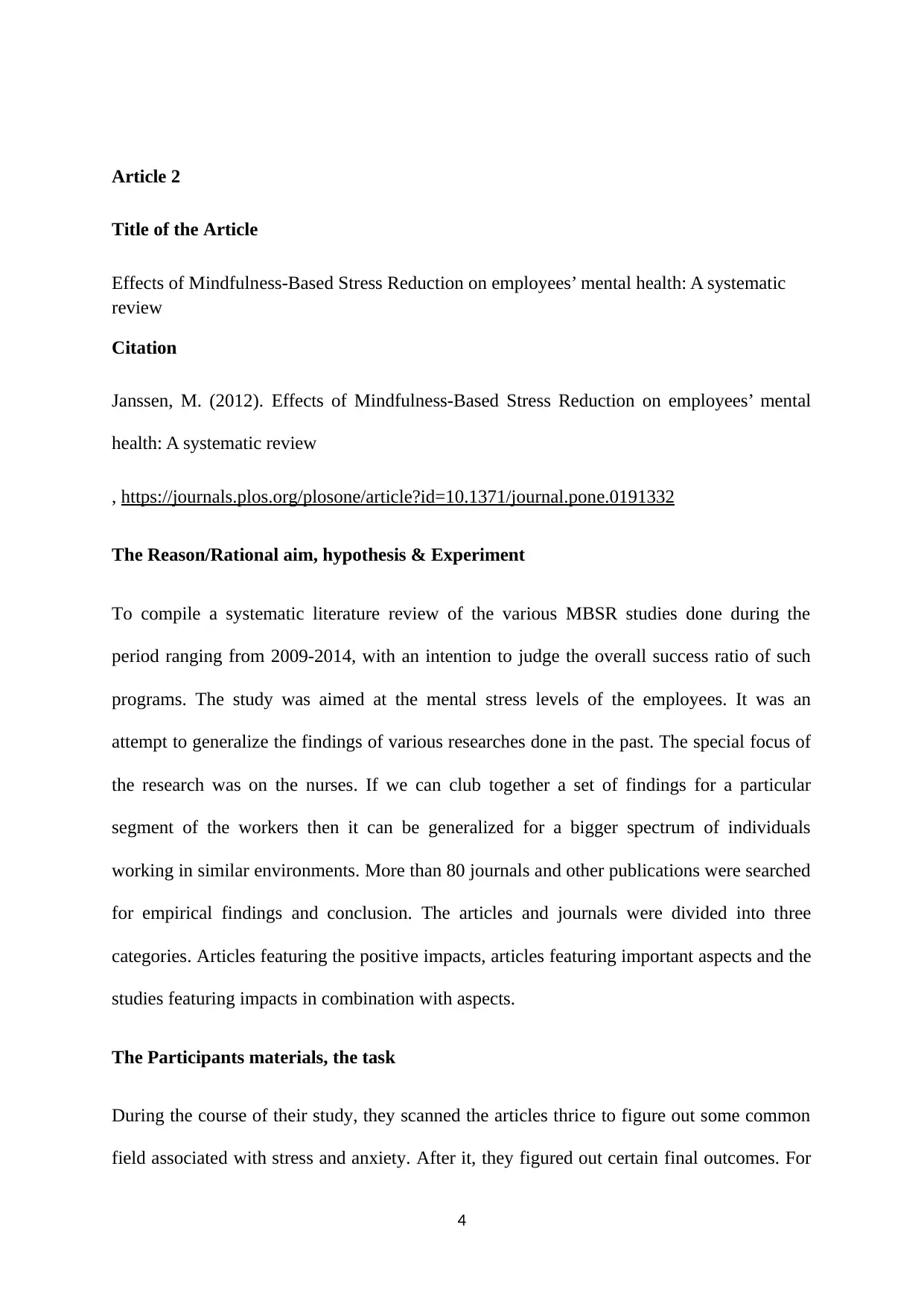
Article 2
Title of the Article
Effects of Mindfulness-Based Stress Reduction on employees’ mental health: A systematic
review
Citation
Janssen, M. (2012). Effects of Mindfulness-Based Stress Reduction on employees’ mental
health: A systematic review
, https://journals.plos.org/plosone/article?id=10.1371/journal.pone.0191332
The Reason/Rational aim, hypothesis & Experiment
To compile a systematic literature review of the various MBSR studies done during the
period ranging from 2009-2014, with an intention to judge the overall success ratio of such
programs. The study was aimed at the mental stress levels of the employees. It was an
attempt to generalize the findings of various researches done in the past. The special focus of
the research was on the nurses. If we can club together a set of findings for a particular
segment of the workers then it can be generalized for a bigger spectrum of individuals
working in similar environments. More than 80 journals and other publications were searched
for empirical findings and conclusion. The articles and journals were divided into three
categories. Articles featuring the positive impacts, articles featuring important aspects and the
studies featuring impacts in combination with aspects.
The Participants materials, the task
During the course of their study, they scanned the articles thrice to figure out some common
field associated with stress and anxiety. After it, they figured out certain final outcomes. For
4
Title of the Article
Effects of Mindfulness-Based Stress Reduction on employees’ mental health: A systematic
review
Citation
Janssen, M. (2012). Effects of Mindfulness-Based Stress Reduction on employees’ mental
health: A systematic review
, https://journals.plos.org/plosone/article?id=10.1371/journal.pone.0191332
The Reason/Rational aim, hypothesis & Experiment
To compile a systematic literature review of the various MBSR studies done during the
period ranging from 2009-2014, with an intention to judge the overall success ratio of such
programs. The study was aimed at the mental stress levels of the employees. It was an
attempt to generalize the findings of various researches done in the past. The special focus of
the research was on the nurses. If we can club together a set of findings for a particular
segment of the workers then it can be generalized for a bigger spectrum of individuals
working in similar environments. More than 80 journals and other publications were searched
for empirical findings and conclusion. The articles and journals were divided into three
categories. Articles featuring the positive impacts, articles featuring important aspects and the
studies featuring impacts in combination with aspects.
The Participants materials, the task
During the course of their study, they scanned the articles thrice to figure out some common
field associated with stress and anxiety. After it, they figured out certain final outcomes. For
4
Paraphrase This Document
Need a fresh take? Get an instant paraphrase of this document with our AI Paraphraser
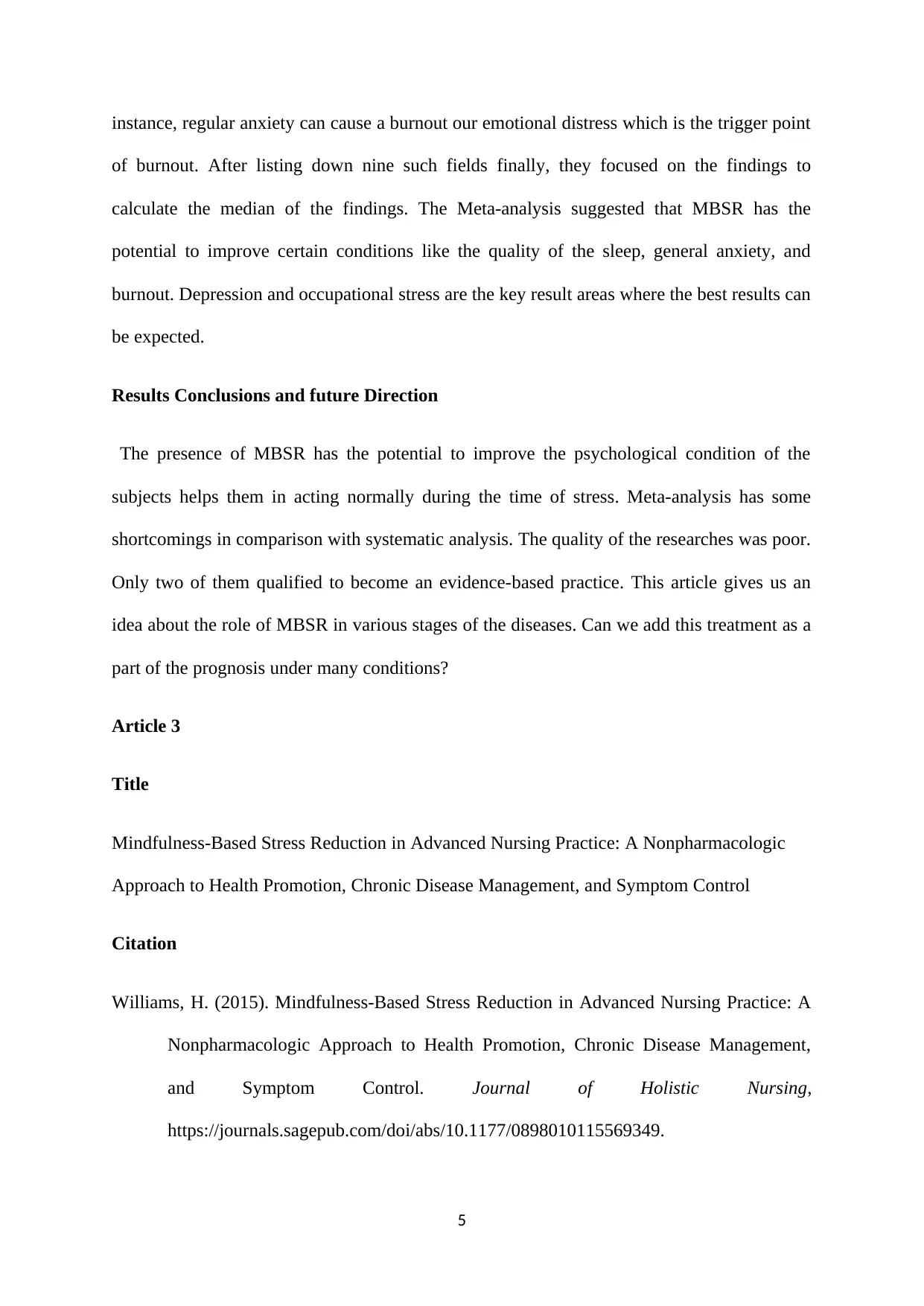
instance, regular anxiety can cause a burnout our emotional distress which is the trigger point
of burnout. After listing down nine such fields finally, they focused on the findings to
calculate the median of the findings. The Meta-analysis suggested that MBSR has the
potential to improve certain conditions like the quality of the sleep, general anxiety, and
burnout. Depression and occupational stress are the key result areas where the best results can
be expected.
Results Conclusions and future Direction
The presence of MBSR has the potential to improve the psychological condition of the
subjects helps them in acting normally during the time of stress. Meta-analysis has some
shortcomings in comparison with systematic analysis. The quality of the researches was poor.
Only two of them qualified to become an evidence-based practice. This article gives us an
idea about the role of MBSR in various stages of the diseases. Can we add this treatment as a
part of the prognosis under many conditions?
Article 3
Title
Mindfulness-Based Stress Reduction in Advanced Nursing Practice: A Nonpharmacologic
Approach to Health Promotion, Chronic Disease Management, and Symptom Control
Citation
Williams, H. (2015). Mindfulness-Based Stress Reduction in Advanced Nursing Practice: A
Nonpharmacologic Approach to Health Promotion, Chronic Disease Management,
and Symptom Control. Journal of Holistic Nursing,
https://journals.sagepub.com/doi/abs/10.1177/0898010115569349.
5
of burnout. After listing down nine such fields finally, they focused on the findings to
calculate the median of the findings. The Meta-analysis suggested that MBSR has the
potential to improve certain conditions like the quality of the sleep, general anxiety, and
burnout. Depression and occupational stress are the key result areas where the best results can
be expected.
Results Conclusions and future Direction
The presence of MBSR has the potential to improve the psychological condition of the
subjects helps them in acting normally during the time of stress. Meta-analysis has some
shortcomings in comparison with systematic analysis. The quality of the researches was poor.
Only two of them qualified to become an evidence-based practice. This article gives us an
idea about the role of MBSR in various stages of the diseases. Can we add this treatment as a
part of the prognosis under many conditions?
Article 3
Title
Mindfulness-Based Stress Reduction in Advanced Nursing Practice: A Nonpharmacologic
Approach to Health Promotion, Chronic Disease Management, and Symptom Control
Citation
Williams, H. (2015). Mindfulness-Based Stress Reduction in Advanced Nursing Practice: A
Nonpharmacologic Approach to Health Promotion, Chronic Disease Management,
and Symptom Control. Journal of Holistic Nursing,
https://journals.sagepub.com/doi/abs/10.1177/0898010115569349.
5
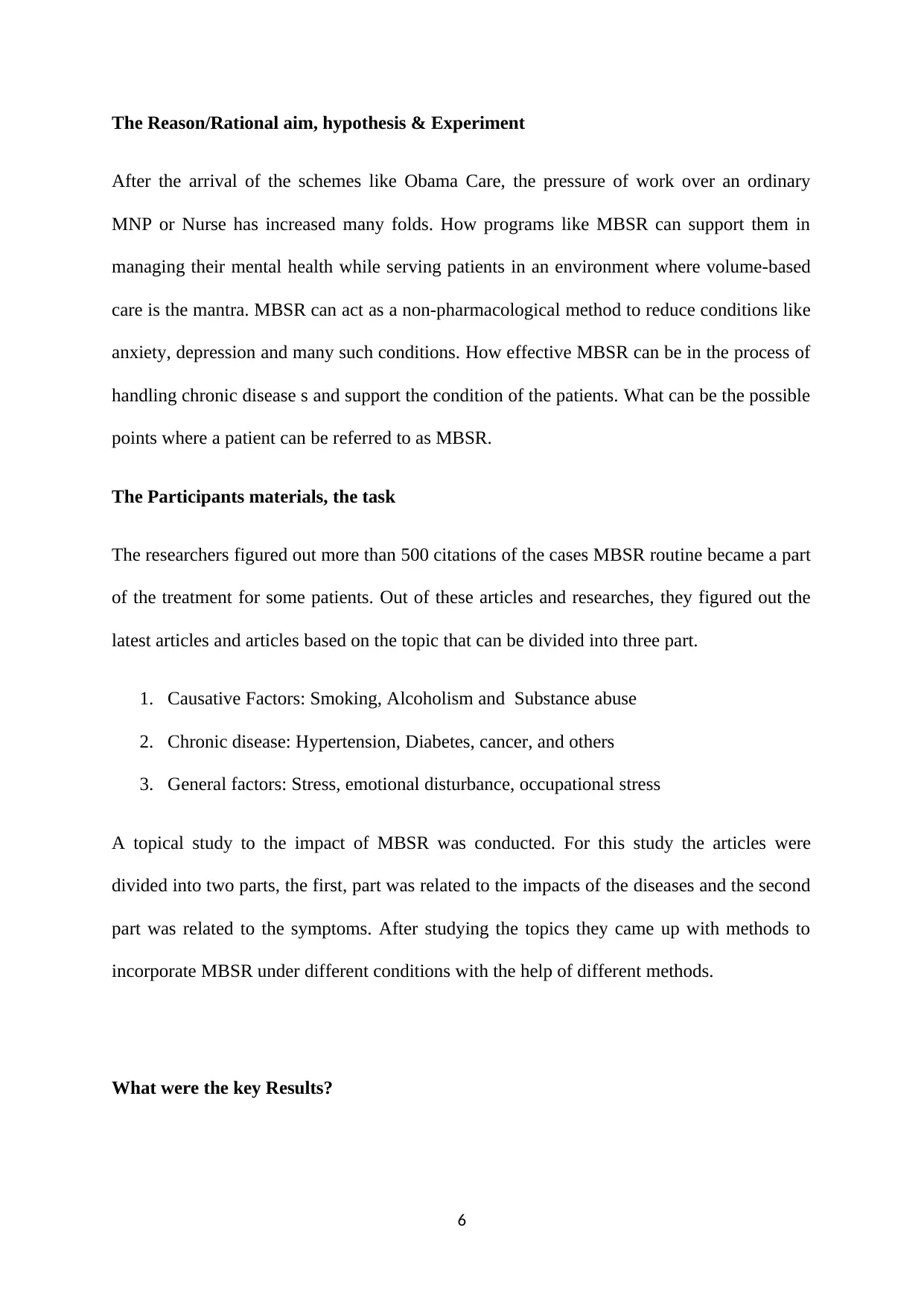
The Reason/Rational aim, hypothesis & Experiment
After the arrival of the schemes like Obama Care, the pressure of work over an ordinary
MNP or Nurse has increased many folds. How programs like MBSR can support them in
managing their mental health while serving patients in an environment where volume-based
care is the mantra. MBSR can act as a non-pharmacological method to reduce conditions like
anxiety, depression and many such conditions. How effective MBSR can be in the process of
handling chronic disease s and support the condition of the patients. What can be the possible
points where a patient can be referred to as MBSR.
The Participants materials, the task
The researchers figured out more than 500 citations of the cases MBSR routine became a part
of the treatment for some patients. Out of these articles and researches, they figured out the
latest articles and articles based on the topic that can be divided into three part.
1. Causative Factors: Smoking, Alcoholism and Substance abuse
2. Chronic disease: Hypertension, Diabetes, cancer, and others
3. General factors: Stress, emotional disturbance, occupational stress
A topical study to the impact of MBSR was conducted. For this study the articles were
divided into two parts, the first, part was related to the impacts of the diseases and the second
part was related to the symptoms. After studying the topics they came up with methods to
incorporate MBSR under different conditions with the help of different methods.
What were the key Results?
6
After the arrival of the schemes like Obama Care, the pressure of work over an ordinary
MNP or Nurse has increased many folds. How programs like MBSR can support them in
managing their mental health while serving patients in an environment where volume-based
care is the mantra. MBSR can act as a non-pharmacological method to reduce conditions like
anxiety, depression and many such conditions. How effective MBSR can be in the process of
handling chronic disease s and support the condition of the patients. What can be the possible
points where a patient can be referred to as MBSR.
The Participants materials, the task
The researchers figured out more than 500 citations of the cases MBSR routine became a part
of the treatment for some patients. Out of these articles and researches, they figured out the
latest articles and articles based on the topic that can be divided into three part.
1. Causative Factors: Smoking, Alcoholism and Substance abuse
2. Chronic disease: Hypertension, Diabetes, cancer, and others
3. General factors: Stress, emotional disturbance, occupational stress
A topical study to the impact of MBSR was conducted. For this study the articles were
divided into two parts, the first, part was related to the impacts of the diseases and the second
part was related to the symptoms. After studying the topics they came up with methods to
incorporate MBSR under different conditions with the help of different methods.
What were the key Results?
6
⊘ This is a preview!⊘
Do you want full access?
Subscribe today to unlock all pages.

Trusted by 1+ million students worldwide
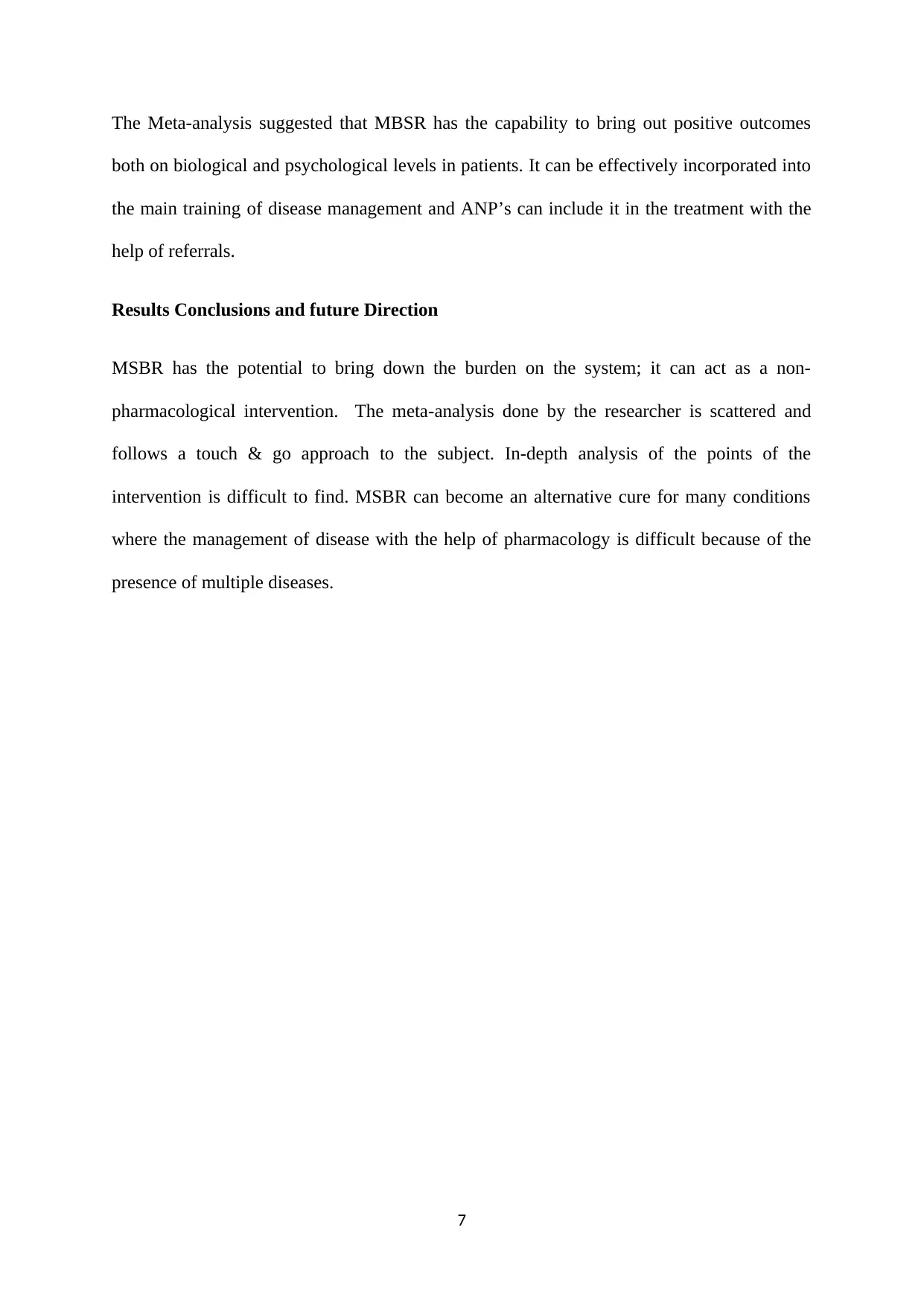
The Meta-analysis suggested that MBSR has the capability to bring out positive outcomes
both on biological and psychological levels in patients. It can be effectively incorporated into
the main training of disease management and ANP’s can include it in the treatment with the
help of referrals.
Results Conclusions and future Direction
MSBR has the potential to bring down the burden on the system; it can act as a non-
pharmacological intervention. The meta-analysis done by the researcher is scattered and
follows a touch & go approach to the subject. In-depth analysis of the points of the
intervention is difficult to find. MSBR can become an alternative cure for many conditions
where the management of disease with the help of pharmacology is difficult because of the
presence of multiple diseases.
7
both on biological and psychological levels in patients. It can be effectively incorporated into
the main training of disease management and ANP’s can include it in the treatment with the
help of referrals.
Results Conclusions and future Direction
MSBR has the potential to bring down the burden on the system; it can act as a non-
pharmacological intervention. The meta-analysis done by the researcher is scattered and
follows a touch & go approach to the subject. In-depth analysis of the points of the
intervention is difficult to find. MSBR can become an alternative cure for many conditions
where the management of disease with the help of pharmacology is difficult because of the
presence of multiple diseases.
7
Paraphrase This Document
Need a fresh take? Get an instant paraphrase of this document with our AI Paraphraser
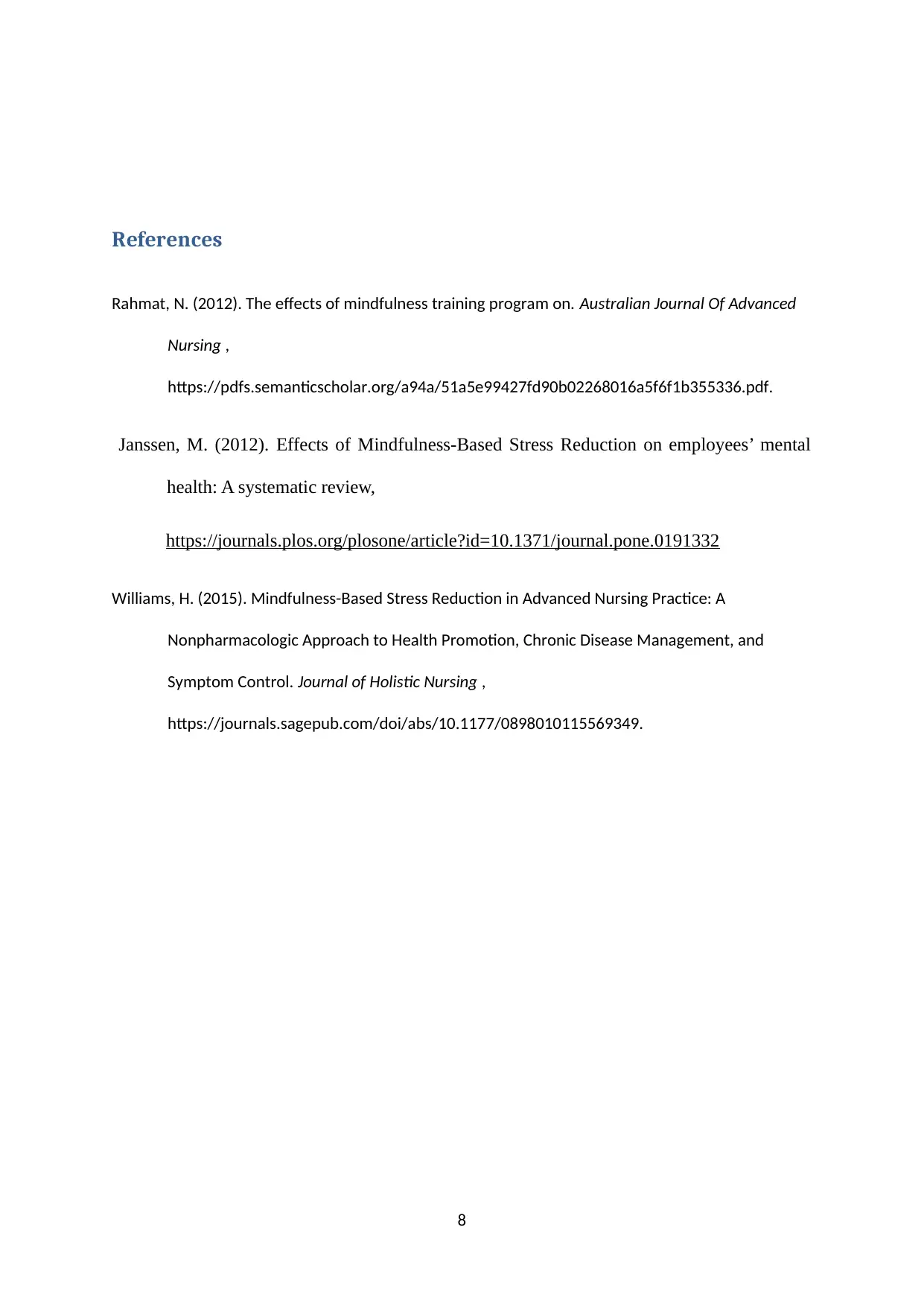
References
Rahmat, N. (2012). The effects of mindfulness training program on. Australian Journal Of Advanced
Nursing ,
https://pdfs.semanticscholar.org/a94a/51a5e99427fd90b02268016a5f6f1b355336.pdf.
Janssen, M. (2012). Effects of Mindfulness-Based Stress Reduction on employees’ mental
health: A systematic review,
https://journals.plos.org/plosone/article?id=10.1371/journal.pone.0191332
Williams, H. (2015). Mindfulness-Based Stress Reduction in Advanced Nursing Practice: A
Nonpharmacologic Approach to Health Promotion, Chronic Disease Management, and
Symptom Control. Journal of Holistic Nursing ,
https://journals.sagepub.com/doi/abs/10.1177/0898010115569349.
8
Rahmat, N. (2012). The effects of mindfulness training program on. Australian Journal Of Advanced
Nursing ,
https://pdfs.semanticscholar.org/a94a/51a5e99427fd90b02268016a5f6f1b355336.pdf.
Janssen, M. (2012). Effects of Mindfulness-Based Stress Reduction on employees’ mental
health: A systematic review,
https://journals.plos.org/plosone/article?id=10.1371/journal.pone.0191332
Williams, H. (2015). Mindfulness-Based Stress Reduction in Advanced Nursing Practice: A
Nonpharmacologic Approach to Health Promotion, Chronic Disease Management, and
Symptom Control. Journal of Holistic Nursing ,
https://journals.sagepub.com/doi/abs/10.1177/0898010115569349.
8
1 out of 8
Your All-in-One AI-Powered Toolkit for Academic Success.
+13062052269
info@desklib.com
Available 24*7 on WhatsApp / Email
![[object Object]](/_next/static/media/star-bottom.7253800d.svg)
Unlock your academic potential
Copyright © 2020–2025 A2Z Services. All Rights Reserved. Developed and managed by ZUCOL.